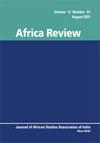Human Mobility and Climate Change Adaptation in Small-Scale Farming Areas in Eastern Zimbabwe
IF 0.5
Q4 AREA STUDIES
引用次数: 1
Abstract
This paper examines the role played by human mobility as a climate change adaptation strategy in Zimbabwe’s small-scale farming areas. Livelihoods in Zimbabwe’s small-scale farming areas are mostly agriculture-based and have long suffered from low levels of production. This is largely due to poor agroecological conditions and lack of agricultural investment, including income diversification projects from the central government. Recently, extreme climatic events in these areas have exacerbated food insecurity challenges, prompting many households to relocate. The findings of this study indicate that most households in the small-scale farming regions are resorting to either short- or long-term migration to areas that offer them food security. In these areas, poor households are forced to work on large commercial farms where they are paid in maize grain or trade their products for food to support their families. This paper argues that, if properly used together with other climate change policies promoted in Zimbabwe, human mobility can be an effective climate change adaptation strategy in small-scale farming areas.津巴布韦东部小农地区的人口流动和气候变化适应
本文考察了人口流动作为一项气候变化适应战略在津巴布韦小规模农业地区所发挥的作用。津巴布韦小规模农业地区的生计主要以农业为基础,长期以来一直受到低生产水平的影响。这主要是由于恶劣的农业生态条件和缺乏农业投资,包括中央政府的收入多样化项目。最近,这些地区的极端气候事件加剧了粮食不安全挑战,促使许多家庭搬迁。这项研究的结果表明,小规模农业地区的大多数家庭正在采取短期或长期迁移的方式,向能够提供粮食安全的地区迁移。在这些地区,贫困家庭被迫在大型商业农场工作,在那里他们的报酬是玉米谷物,或者用自己的产品换取粮食来养家糊口。本文认为,如果适当地与津巴布韦推广的其他气候变化政策一起使用,人口流动可以成为小规模农业地区有效的气候变化适应战略。
本文章由计算机程序翻译,如有差异,请以英文原文为准。
求助全文
约1分钟内获得全文
求助全文
来源期刊

Africa Review
AREA STUDIES-
CiteScore
1.80
自引率
12.50%
发文量
22
期刊介绍:
Africa Review is an interdisciplinary academic journal of the African Studies Association of India (ASA India) and focuses on theoretical, historical, literary and developmental enquiries related to African affairs. The central aim of the journal is to promote a scholarly understanding of developments and change in Africa, publishing both original scholarship on developments in individual countries as well as comparative analyses examining the wider region. The journal serves the full spectrum of social science disciplinary communities, including anthropology, archaeology, history, law, sociology, demography, development studies, economics, education, gender studies, industrial relations, literature, politics and urban studies.
 求助内容:
求助内容: 应助结果提醒方式:
应助结果提醒方式:


